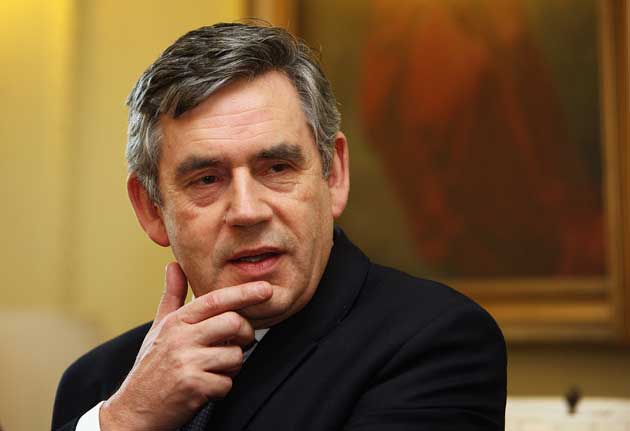Cameron: This will be the new age of austerity
As Brown enters the twilight zone, Labour is mired in angry recriminations

David Cameron will today attempt to capitalise on the Government's economic difficulties – and present himself as a credible alternative prime minister – with a pledge to impose a "culture of thrift" on Whitehall if the Conservatives win the next general election.
The Tory leader, although refusing to be drawn on his own economic plans, will hit out at Labour's "irresponsibility", which he claims has accelerated Britain's plunge into the deepest recession since the Second World War. He will warn increasingly confident Conservative activists that a Tory government would still mark the onset of "an age of austerity", as it attempts to guide the economy towards recovery.
As Gordon Brown continues his struggle to control the fallout from a sobering Budget last week, the Tory leader will attempt to ensure the Prime Minister does not escape blame for the financial crisis.
Tony Blair was reported to have raised concerns about taxing the rich in response to the deepening crisis, while his former confidants Lord Mandelson, Alastair Campbell and Lance Price have all weighed in with their concerns over the direction of the Labour Party.
In a speech to the Conservative spring forum in Cheltenham, Mr Cameron will say: "At home we're now seeing the reckoning for Labour's economic incompetence. The age of irresponsibility is giving way to the age of austerity. So this is no time for business as usual. There is only one way out of this mess, and that is through massive change. We need a massive culture change at every level of government, so the state is no longer casual, but careful, with public money."
Mr Cameron will promise a new "culture of thrift" under a Conservative government, where ministers and mandarins will be penalised – even sacked – for breaking departmental spending limits. The drive for efficiencies at the centre of government would mark the end for expensive projects including ID cards and the Contact Point child protection database.
However, the Tory leader will not give in to growing demands from senior Tories for a decisive response to Chancellor Alistair Darling's proposal for a 50p tax band for those earning more than £150,000. The new top rate, seen by many Cameron allies as a "trap" designed to draw the Tories into an old-fashioned row over tax, threatened to develop into a problem for Mr Brown yesterday, amid claims that Labour grandees, including Tony Blair, were opposed to the move.
Sources close to the former prime minister were forced to dismiss suggestions that he had expressed "dismay" over the decision to abandon New Labour shibboleths and tax the rich. Blairites within the Cabinet are believed to have argued for the new top-rate tax level to be raised to earnings of £200,000 and over.
The Daily Telegraph quoted an unnamed "friend" of Mr Blair as saying: "Tony thought the original proposal to raise the top rate to 45p was just about saleable in the current economic circumstances. But he believes taking 50p is not acceptable. He thinks it's a terrible mistake."
A spokesman for Mr Blair, who is in America, said: "Tony Blair has made no comment on the Budget. No one has been authorised to speak on his behalf. Tony Blair continues to be fully supportive of Gordon Brown and the Labour Government."
Another architect of New Labour, Lord Mandelson, warned the party against shifting to the left in response to the economic downturn. In an interview yesterday in The Times, the Business Secretary said: "If we imagine, as some argue, that the antidote to Cameron is left-wing socialism, that the dividing line between us and David Cameron should be to make him a right-winger and us the left-wingers, that will lead to defeat."
Alastair Campbell, Mr Blair's former spin-doctor, added to the general feeling of despair after the Budget last week with a downbeat entry on his blog. "I confess to being a bit down after the Budget," Mr Campbell said. "Not for nothing, I guess, is a grim economic situation described as a depression."
Speculation about Mr Brown's future had restarted before the Budget because of the controversy over the Downing Street aide Damian McBride's emails smearing senior Tories. Mr Brown's authority will be further weakened if his proposal for a daily attendance rate, to end the controversy over MP's expenses, is rejected by his own side.
Charles Clarke, the former home secretary, said: "MPs haven't reacted to the Budget with the belief that the problems with the economy have been sorted out."
Lance Price, formerly Mr Campbell's deputy in Downing Street, said New Labour had been left "in a coma" after the Budget. "The prognosis for a recovery in the short term looks bleak. And having delivered three remarkable election victories, the chances of it reviving in time to help secure a fourth are receding every day."
But Mr Brown maintained that the Budget was vital for Britain's recovery from the recession. He told Labour activists at the party's Welsh conference in Swansea it was right that those who had done the best in recent years should pay more tax to help the country through difficult economic times. "I don't like raising taxes," the Prime Minister said. "In fact, we cut the basic rate of tax to 20p. You don't tax for its own sake, only for meeting the needs of our country."
'Can it really be that bad?' hamish mcrae, pages 12-13
Subscribe to Independent Premium to bookmark this article
Want to bookmark your favourite articles and stories to read or reference later? Start your Independent Premium subscription today.

Join our commenting forum
Join thought-provoking conversations, follow other Independent readers and see their replies